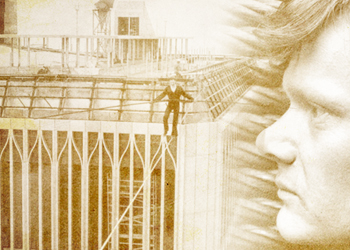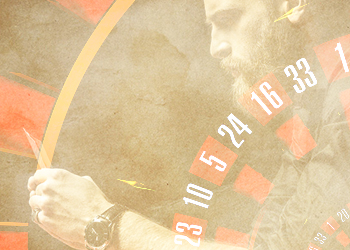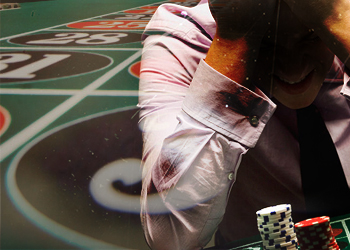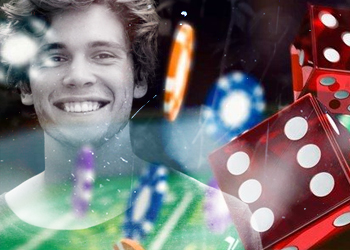Casino Support for Problem Gamblers
Added on October 1, 2025, in Gambling Articles by Dejan Gavrilovic
High-wire High Rollers, Their Abyss and Safety Nets
On a bright and sunny morning in New York City on August 7, 1974, the skies were nearly cloudless. At just after seven in the morning, as Philippe Petit took his inaugural step, the weather was enjoyable with a temperature of 70° Fahrenheit accompanied by a gentle breeze from the east.
Stepping from the unfinished building of World Trade Center into 440 pounds of one inch braided steel cable suspended across 142 feet long gap between Twin Towers at a height of 1,368 feet — with nothing more but 30-foot long, 55-pound balancing pole in his hands — twenty-four years old French high-wire artist…
…performed the high-wire walk that lasted for 45 minutes encompassing eight building-to-building crossings.
Conceived when he was eighteen years old and inspired by an article that described proposed construction of the buildings in 1968, the stunt took him six years of planning.
The process comprised of analyzing weather patterns and towers behavior in the wind, learning the architecture and construction, renting a helicopter to take aerial photographs, using forged ID cards to gain unauthorized access to building sites for eight months, impersonating press reporters before Guy Tozzoli, President of WTC Association, hiding in the upper floors and on the roofs to study security measures and habits of construction workers, bow and arrow training in order to set the fishing line, equipment testing, not to mention his personal training and full onsite rigging done the night before illegally.
Soon after Philippe begun the “artistic crime of the century” to which he referred to as “le coup”, thousands of New Yorkers in Lower Manhattan on their way in to work observed his performance in wonder and disbelief, transfixed, stopped in their tracks. Their murmurs and cheers followed shortly.
So did the NYPD, FDNY, and Port Authority officers that came up to the roofs of both buildings trying to persuade him to get off the wire.
Journalists and press had a feast day.
Upon finishing his skywalk that also included dance, laying down on the wire and salute to the watchers on one knee, Philippe was to face the consequences — immediate custody compounded with an incredible magnitude of media coverage and public appreciation.
The district attorney dropped all formal charges — 14 misdemeanors — in exchange for another free high-wire walk, this time for children above Turtle Pond in Central Park.
Credited with bringing much-needed attention to the Twin Towers and reinvigorating the process of offices rental in time of economic recession, Philippe Petit was given a lifetime pass to the World Trade Center Observation Deck by the Port Authority, the official owner of the buildings.
His performance became an instant part of New York City history further perpetuated through a number of award-winning books and movies depicting “le coup”.
Meanwhile, Philippe has made dozens of similar performances while residing in NYC as artist-in-residence. Nowadays he gives lectures and serves as inspiration and testimonial to human capacities, perseverance, and belief.
One question does remain, though.
What would have happened if he felt, free-falling to Manhattan pavement?
High Rollers’ Abyss
Indeed, what would be the thoughts of a human being plummeting through the abyss of its own ambitions and expectations? What pictures could be going through the mind that faces the consequences of the illusion of control over the outcome? What feelings rule when one is confronted with the costs of distorted thinking, fallacies, and the relentless pursuit of adrenaline rush?
Luckily, Philippe Petit never had to experience it.
To the contrary, gamblers with the compulsive disorder do.
For them, it begins somewhere deep inside. Something, at some point, goes astray. Whether it is stress or anxiety or a desire or any other reason is certainly personal— each one of us has its own. By chasing elusive rewards these people progressively increase the risks every day. Nothing is enough. There is no edge of the cliff. There is no cliff. Even if it does exist, it’s for someone else; it doesn’t apply to them.
In their minds, the recovery is mandatory inclusion. Tolerance to losses works overtime building itself into desolator of its own proportions. Never mind today; tomorrow will be the day you’ll get some.
They struggle in silence, battling their inner obsessions alone. Their cognitive disorders are behind the wheel while they try to drown their addictions that have “learned to swim” in the meantime.
Until that very same internal fluid overspills into their lives in form of personal tsunami.
Jobs, career opportunities, professional community — wiped out. Friends, significant relationships, loved ones — deeply hurt, jeopardized beneath the lies, dented for good. Trust, integrity, and self-respect — lost, gone. Reputation, image, outlook — tarnished. Personal finances, properties — shattered. The debt — rapidly increasing. The fear — insurmountable.
The fear is the worst thing. It is the type of fear that comes not from the outside but grows on the inside. The recurring, omnipresent, denying, paralyzing type of fear that is hard to describe and understand. Unless experienced.
In order to put this torment into a quantifiable perspective, according to the World Health Organization, five percent of all suicides are related to compulsive gambling. Referencing another study, almost 40 percent of patients admitted to a treatment program for compulsive gambling had at least one suicide attempt. A tertiary source found that 66 percent of a compulsive gamblers sample had contemplated suicide, and 16 percent made a previous attempt.
Who is to be held responsible, to be blamed for the predicament of compulsive gamblers? Without a single shred of doubt, they are.
You know it, we know it, and they know it. But that’s not the point.
What we need to understand here is this:
We’re talking about intelligent and educated human beings facing the challenge each one of us could face in the future.
It’s not some highly selective, irregular menace that goes only after a certain type of people. Compulsive gambling disorder can happen to anybody.
If you think that you’re immune, great, but what about your child or spouse or parent or best friend? Hope you’ll never have to answer to that question.
But what if you do? To whom will you lean on? Where will your necessary, professional help and support come from?
Friedrich Nietzsche, a German philosopher writes in his Beyond Good and Evil:
“He who fights with monsters should look to it that he himself does not become a monster. And if you gaze long into an abyss, the abyss also gazes into you.”
We, the human race, are fighting with the monster of compulsive gambling disorder here. We have gazed into its abyss for a very, very long time throughout our history. The abyss has been also gazing into us for quite some time.
And now we have decided to not gaze back, to stop the vicious cycle.
Instead, to tackle the monster we decided to gaze into ourselves. Together.
The Safety Nets
Twenty or thirty years ago we were not able to talk openly about depression, another monster. It was off-putting to admit such a weakness. Yet here we are today discussing it at large, publicly, transparently, as well as privately. We embraced it.
Depression is no more the elephant in the room. In fact, there is no elephant and there is no room. Just us and what’s inside.
People that suffer from depression are not stigmatized anymore. Instead, they enjoy a widespread network of support based on our mindful and meaningful understanding and acceptance.
We realized that one cannot prevent the consequence before pre-empting its cause.
Same is happening with compulsive gambling disorder today. We realize that onus cannot be only on casinos but on society too. Only the combined efforts will result in success.
Casinos are in a peculiar position, for sure. Every initiative in this area results in them losing some of their revenues. Before we roll our eyes on this, let’s be honest — would we ban a person and good spender from our restaurant for no other reason than his own good?
And yet again…
…casinos lead the way in a number of initiatives jointly with state regulators.
In 2017 — an eventful and milestone year in this undertaking — the American Gaming Association (AGA) rolled out a new code of conduct deploying consumer protection measures meant to promote responsible gambling. According to Elizabeth Cronan, the AGA’s senior director of gaming policy:
“Responsible gambling is an everyday, year-round responsibility that we have to every player… We appreciate that this is an issue that must be top-of-mind industry-wide for all employees, from those that interact daily with consumers on the gaming floor to the senior executive leadership and the boards of directors.”
Under the new code of conduct casinos are:
- To generally explain games’ odds of winning or losing to the players;
- To provide training for employees so they can deal with underage gamblers and other issues;
- Not use claims promoting the guarantee of social, financial or personal success in their advertising.
The AGA initiative is aimed towards estimated 2% of irresponsible gamblers in the industry. This two percent is a noteworthy and telling statistic. Not every gambler is one with compulsive gambling disorder.
Even if take a grain of salt on this figure — no, let’s take a pound of salt — and triple it, it is still in low single digit area of a total number of gamblers. Therefore any generalization in order to equalize terms of gamblers and compulsive gamblers is not only misleading but counterproductive.
At the same time, the Massachusetts Gaming Commission decided on the requirement for all state casino operators to implement GameSense, a program developed by the British Columbia Lottery Corporation in Canada, in 2009.
Speaking about it, the BCLC’s President and CEO Jim Lightbody said:
“We take our response to problem gambling very seriously.”
According to GameSense website, it combines recommendations on responsible gaming with interactive tools and exhibits meant to engage patrons in the casinos providing information on odds of gambling games and on principles of gambling.
GameSense also trains dealers, pit bosses, and food servers what to do if they see a gambler in distress with signs that include:
- Pounding a fist on a table or device
- Yelling out
- Spending more and more time at the slot machines
In parallel endeavor, MGM Resorts International committed to GameSense program by rolling it out in all of their US properties. As part of the commitment, MGM promised to give $1 million in the next five years for a research partnership with BCLC and International Gaming Institute at the University of Nevada in Las Vegas, raising more awareness of the gambling responsibility.
Similar efforts are underway on the international stage.
Casinos in Austria and the Netherlands employ best practices such as:
- Visitors strict registration
- Players risk assessment of incurring harm to themselves
- Imposing limits in patron’s games when needed
- Excluding the gambler from casinos if necessary
Singapore is considering a following set of rules:
- Casinos to form a dedicated team of counselors to help problem gamblers
- Operators to register all guests who gamble excessively
- Casinos will be empowered to ban compulsive gamblers
A new and de-monopolizing gambling law in Sweden stipulates that:
- Operators are to observe players’ protection from excessive gambling;
- Casinos are to proactively engage in the prevention of early problems and gambling behavior;
- They are to be moderate and realistic in their advertising.
The law also provides players with the option to self-exclude themselves from specific operators for at least 12 months.
In the United Kingdom, the UK Gambling Commission is enforcing strategy that pursues fairer and safer environment for players. Effective multi-layer platform creates “well-regulated gambling market that works for consumers”.
Balancing on the Wire
The unifying theme of these initiatives is human-to-human orientation. Orchestrated as the joint set of activities to be implemented by casinos, endorsed by state regulators, and welcomed by players, they are to enact new rules of engagement when it comes to pros and cons balance of our pastimes.
More transparent communication with patrons in conjunction with perpetual training of casino staff is to lead towards open dialogue that will provide compulsive gamblers with necessary help, not the judgment.
At the same time, it shall empower society to understand and accept this behavioral disorder instead of its rejection and castigation.
In the end, though, the buck stops with players.
Philippe Petit performed his act with the help and dedication of his support team. But up there, high in the air, it was all on him. He balanced the wire and gave us “the most sublime and transcendent episode in the history of World Trade Center”.
Same is with compulsive gambling disorder or any gambling disorder for that matter.
It’s on you, on me, on them, on us.
If you don’t gamble and consider this to be their problem that they called upon themselves, we earnestly implore you to — think again.
If you are the player that doesn’t have this problem and you see someone that could use help — give it without hesitation. Momentarily. For tomorrow you or someone you care for may be in the same situation.
If you are among those two-percenters, please, please don’t forget — you are precious human being. You are not alone in this. Others have been there and returned. Today, when global awareness of the monster you’re tackling is higher than ever before, you have a number of instruments at your disposal. Use them. Talk to professionals, talk to your family and loved ones, talk to the community. Talk to yourself. There is neither shame nor guilt in that. To the contrary, it takes an extraordinary amount of courage to admit this truth. Those couple of words — I have a compulsive gambling disorder, I need your help — is what makes you far greater person than any amount of money will ever be able to make you.
You have. What it takes. To get back.
To where you belong.
To her. To him.
To you.
For only you own yourself.
No one else does nor ever will.









